International Criminal Court: Victim Reparations in Genocide Cases
VerifiedAdded on 2022/08/31
|12
|3312
|10
Essay
AI Summary
This essay critically examines the effectiveness of the International Criminal Court (ICC) in providing reparations to victims of both domestic and international genocide cases. It begins by outlining the historical context of the ICC's creation, emphasizing its role in addressing heinous crimes and providing justice to victims. The discussion delves into the ICC's structure, jurisdiction, and the legal framework established by the Rome Statute. A significant portion of the essay focuses on the rights and safeguards afforded to victims within the ICC system, including their right to participate in proceedings, receive protection, and claim compensation. The analysis explores the challenges and limitations of the ICC's reparation system, considering the practical difficulties of implementing reparations and the varying levels of cooperation from member states. The essay also highlights the ICC's innovative approach to victim participation, contrasting it with earlier tribunals and emphasizing the importance of victim-centered justice. It examines the definition of a 'victim' under the Rome Statute and categorizes the rights available to victims. Overall, the essay provides a comprehensive overview of the ICC's role in genocide cases, its impact on victims, and the complexities of achieving effective reparations within the international legal system.
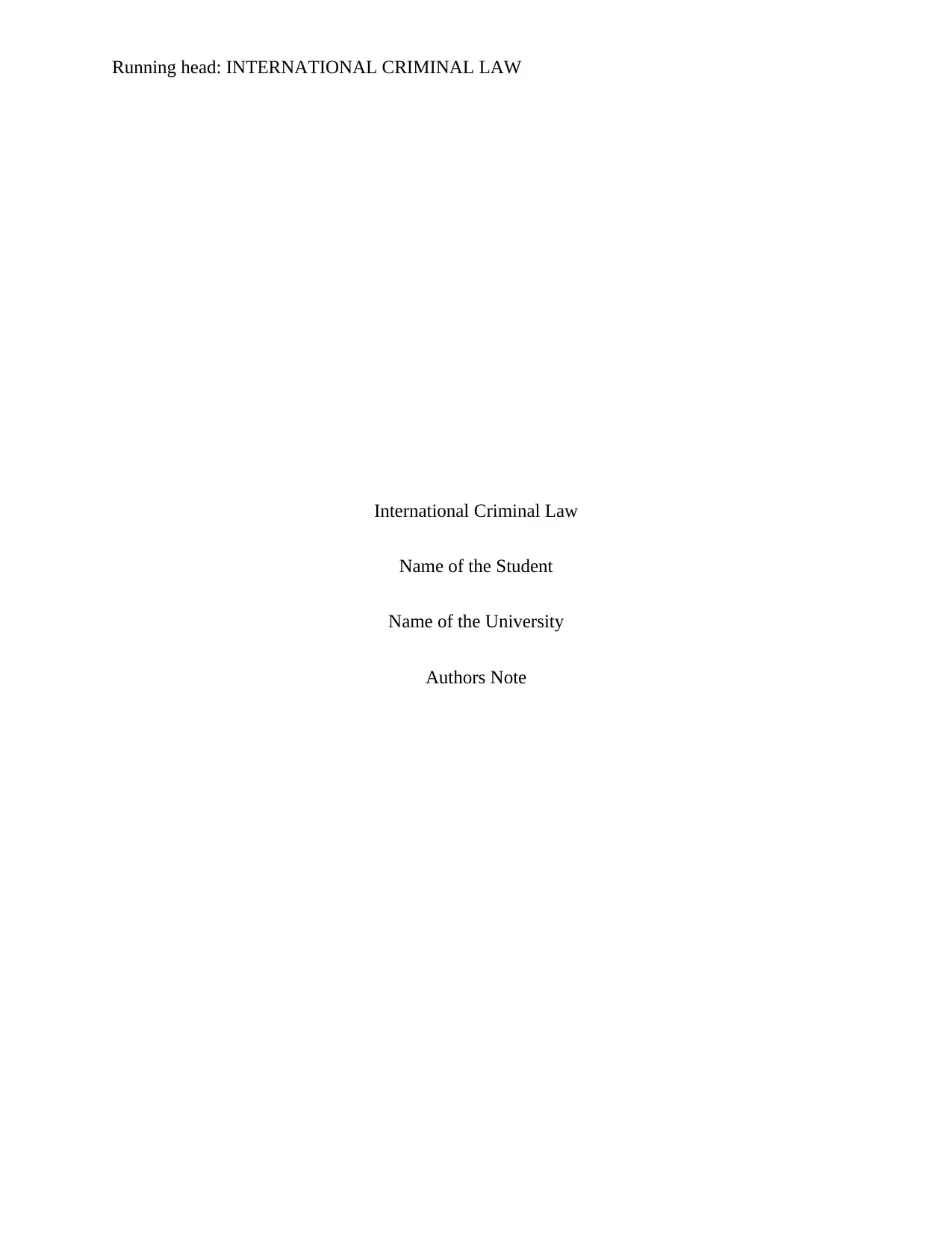
Running head: INTERNATIONAL CRIMINAL LAW
International Criminal Law
Name of the Student
Name of the University
Authors Note
International Criminal Law
Name of the Student
Name of the University
Authors Note
Paraphrase This Document
Need a fresh take? Get an instant paraphrase of this document with our AI Paraphraser
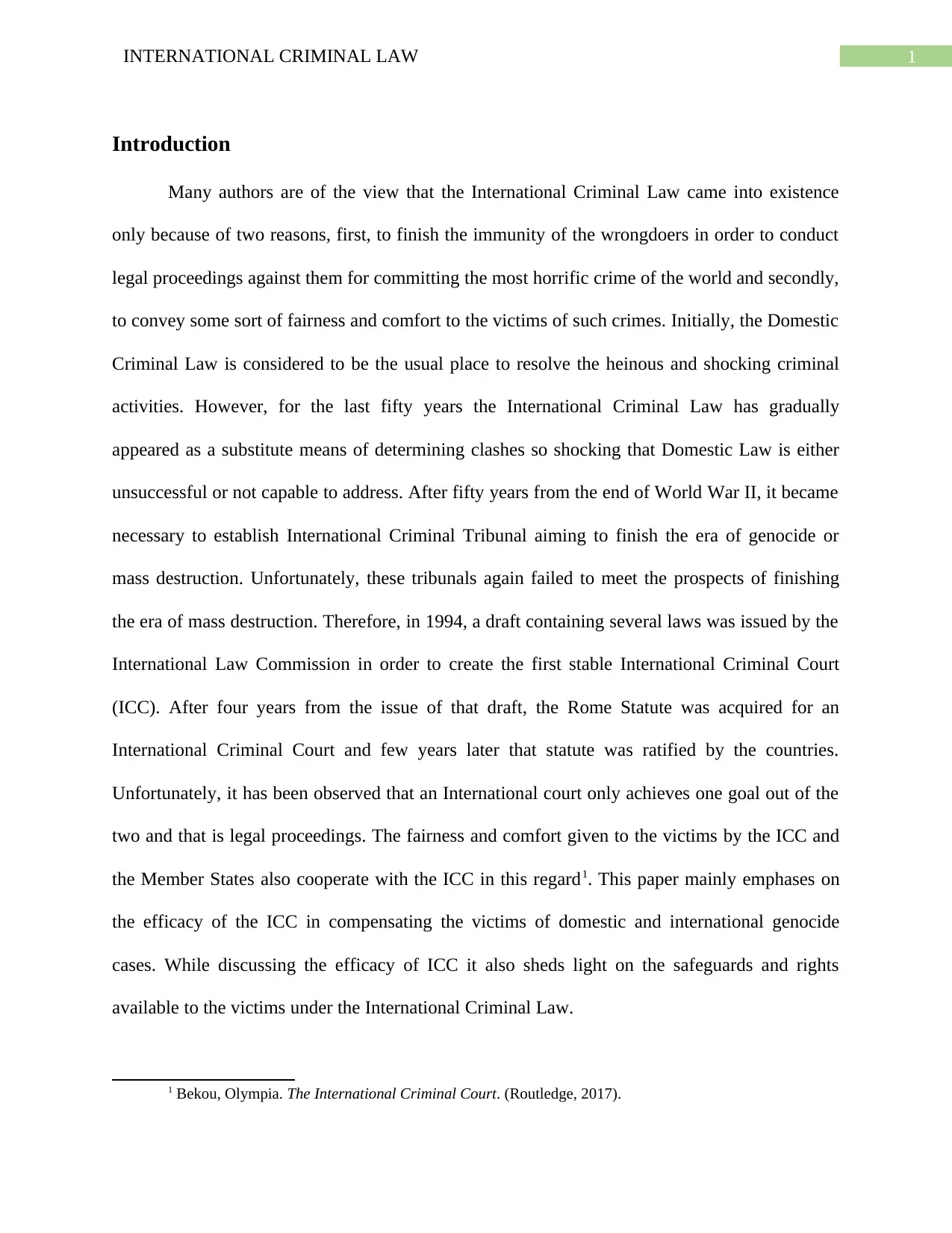
1INTERNATIONAL CRIMINAL LAW
Introduction
Many authors are of the view that the International Criminal Law came into existence
only because of two reasons, first, to finish the immunity of the wrongdoers in order to conduct
legal proceedings against them for committing the most horrific crime of the world and secondly,
to convey some sort of fairness and comfort to the victims of such crimes. Initially, the Domestic
Criminal Law is considered to be the usual place to resolve the heinous and shocking criminal
activities. However, for the last fifty years the International Criminal Law has gradually
appeared as a substitute means of determining clashes so shocking that Domestic Law is either
unsuccessful or not capable to address. After fifty years from the end of World War II, it became
necessary to establish International Criminal Tribunal aiming to finish the era of genocide or
mass destruction. Unfortunately, these tribunals again failed to meet the prospects of finishing
the era of mass destruction. Therefore, in 1994, a draft containing several laws was issued by the
International Law Commission in order to create the first stable International Criminal Court
(ICC). After four years from the issue of that draft, the Rome Statute was acquired for an
International Criminal Court and few years later that statute was ratified by the countries.
Unfortunately, it has been observed that an International court only achieves one goal out of the
two and that is legal proceedings. The fairness and comfort given to the victims by the ICC and
the Member States also cooperate with the ICC in this regard1. This paper mainly emphases on
the efficacy of the ICC in compensating the victims of domestic and international genocide
cases. While discussing the efficacy of ICC it also sheds light on the safeguards and rights
available to the victims under the International Criminal Law.
1 Bekou, Olympia. The International Criminal Court. (Routledge, 2017).
Introduction
Many authors are of the view that the International Criminal Law came into existence
only because of two reasons, first, to finish the immunity of the wrongdoers in order to conduct
legal proceedings against them for committing the most horrific crime of the world and secondly,
to convey some sort of fairness and comfort to the victims of such crimes. Initially, the Domestic
Criminal Law is considered to be the usual place to resolve the heinous and shocking criminal
activities. However, for the last fifty years the International Criminal Law has gradually
appeared as a substitute means of determining clashes so shocking that Domestic Law is either
unsuccessful or not capable to address. After fifty years from the end of World War II, it became
necessary to establish International Criminal Tribunal aiming to finish the era of genocide or
mass destruction. Unfortunately, these tribunals again failed to meet the prospects of finishing
the era of mass destruction. Therefore, in 1994, a draft containing several laws was issued by the
International Law Commission in order to create the first stable International Criminal Court
(ICC). After four years from the issue of that draft, the Rome Statute was acquired for an
International Criminal Court and few years later that statute was ratified by the countries.
Unfortunately, it has been observed that an International court only achieves one goal out of the
two and that is legal proceedings. The fairness and comfort given to the victims by the ICC and
the Member States also cooperate with the ICC in this regard1. This paper mainly emphases on
the efficacy of the ICC in compensating the victims of domestic and international genocide
cases. While discussing the efficacy of ICC it also sheds light on the safeguards and rights
available to the victims under the International Criminal Law.
1 Bekou, Olympia. The International Criminal Court. (Routledge, 2017).
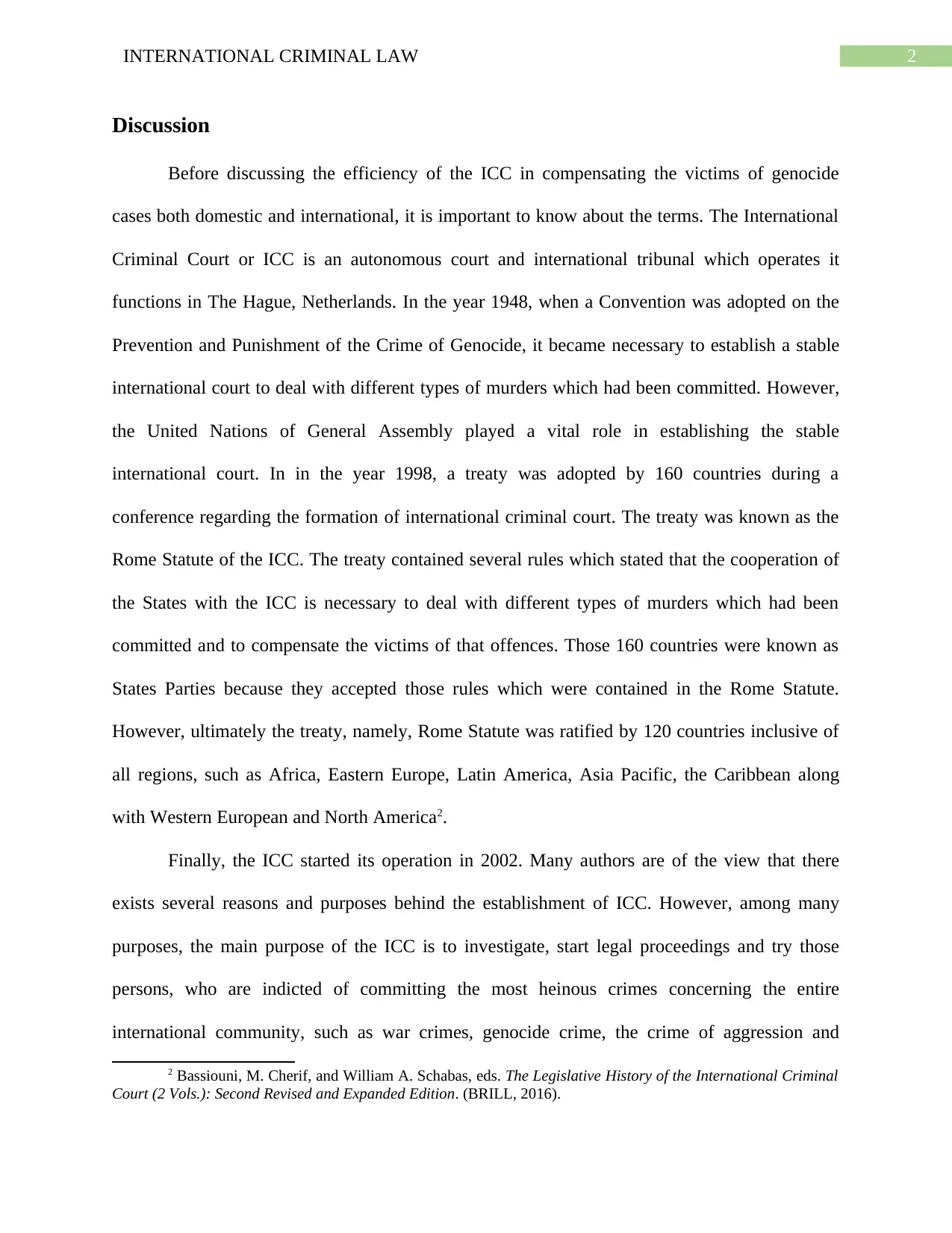
2INTERNATIONAL CRIMINAL LAW
Discussion
Before discussing the efficiency of the ICC in compensating the victims of genocide
cases both domestic and international, it is important to know about the terms. The International
Criminal Court or ICC is an autonomous court and international tribunal which operates it
functions in The Hague, Netherlands. In the year 1948, when a Convention was adopted on the
Prevention and Punishment of the Crime of Genocide, it became necessary to establish a stable
international court to deal with different types of murders which had been committed. However,
the United Nations of General Assembly played a vital role in establishing the stable
international court. In in the year 1998, a treaty was adopted by 160 countries during a
conference regarding the formation of international criminal court. The treaty was known as the
Rome Statute of the ICC. The treaty contained several rules which stated that the cooperation of
the States with the ICC is necessary to deal with different types of murders which had been
committed and to compensate the victims of that offences. Those 160 countries were known as
States Parties because they accepted those rules which were contained in the Rome Statute.
However, ultimately the treaty, namely, Rome Statute was ratified by 120 countries inclusive of
all regions, such as Africa, Eastern Europe, Latin America, Asia Pacific, the Caribbean along
with Western European and North America2.
Finally, the ICC started its operation in 2002. Many authors are of the view that there
exists several reasons and purposes behind the establishment of ICC. However, among many
purposes, the main purpose of the ICC is to investigate, start legal proceedings and try those
persons, who are indicted of committing the most heinous crimes concerning the entire
international community, such as war crimes, genocide crime, the crime of aggression and
2 Bassiouni, M. Cherif, and William A. Schabas, eds. The Legislative History of the International Criminal
Court (2 Vols.): Second Revised and Expanded Edition. (BRILL, 2016).
Discussion
Before discussing the efficiency of the ICC in compensating the victims of genocide
cases both domestic and international, it is important to know about the terms. The International
Criminal Court or ICC is an autonomous court and international tribunal which operates it
functions in The Hague, Netherlands. In the year 1948, when a Convention was adopted on the
Prevention and Punishment of the Crime of Genocide, it became necessary to establish a stable
international court to deal with different types of murders which had been committed. However,
the United Nations of General Assembly played a vital role in establishing the stable
international court. In in the year 1998, a treaty was adopted by 160 countries during a
conference regarding the formation of international criminal court. The treaty was known as the
Rome Statute of the ICC. The treaty contained several rules which stated that the cooperation of
the States with the ICC is necessary to deal with different types of murders which had been
committed and to compensate the victims of that offences. Those 160 countries were known as
States Parties because they accepted those rules which were contained in the Rome Statute.
However, ultimately the treaty, namely, Rome Statute was ratified by 120 countries inclusive of
all regions, such as Africa, Eastern Europe, Latin America, Asia Pacific, the Caribbean along
with Western European and North America2.
Finally, the ICC started its operation in 2002. Many authors are of the view that there
exists several reasons and purposes behind the establishment of ICC. However, among many
purposes, the main purpose of the ICC is to investigate, start legal proceedings and try those
persons, who are indicted of committing the most heinous crimes concerning the entire
international community, such as war crimes, genocide crime, the crime of aggression and
2 Bassiouni, M. Cherif, and William A. Schabas, eds. The Legislative History of the International Criminal
Court (2 Vols.): Second Revised and Expanded Edition. (BRILL, 2016).
⊘ This is a preview!⊘
Do you want full access?
Subscribe today to unlock all pages.

Trusted by 1+ million students worldwide
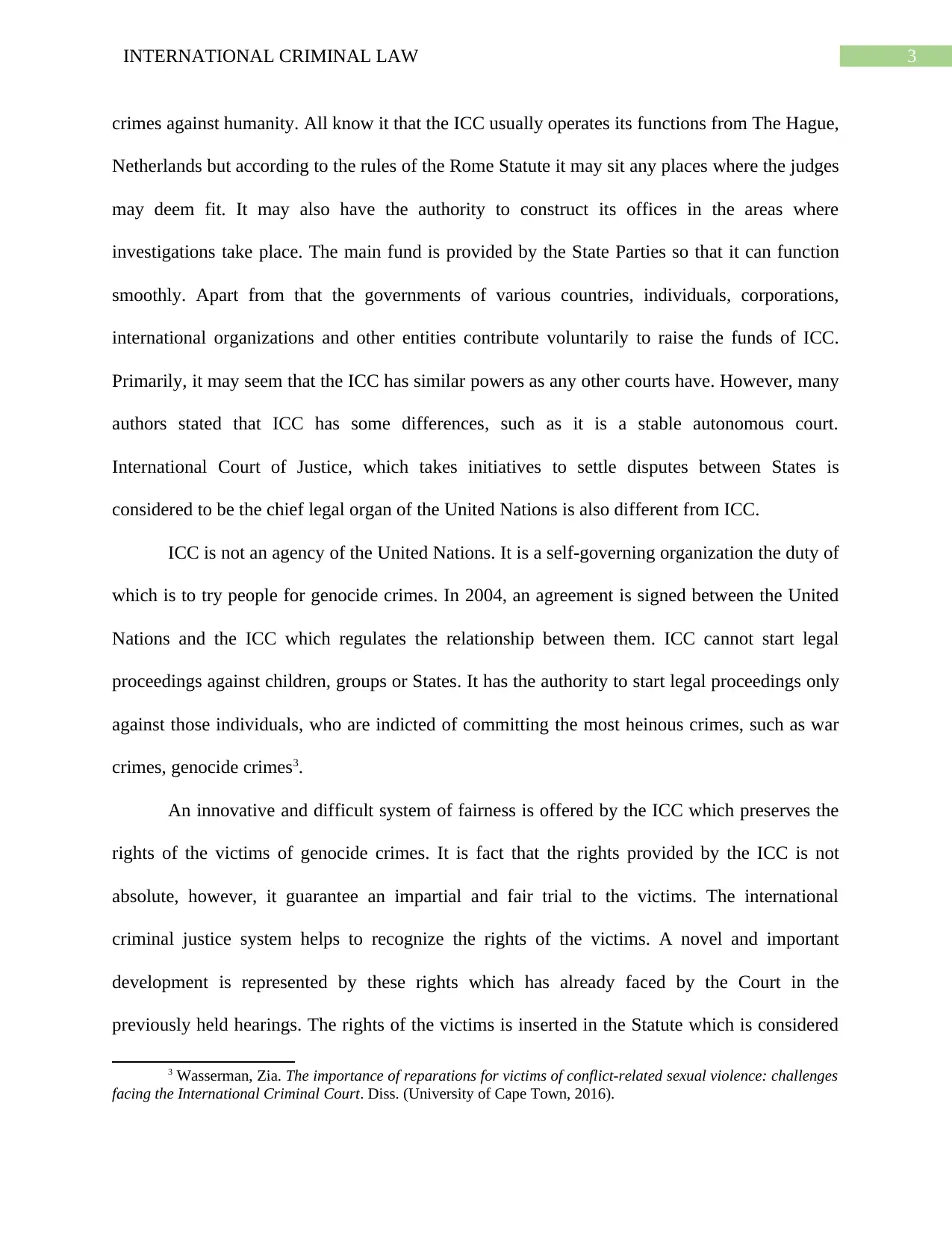
3INTERNATIONAL CRIMINAL LAW
crimes against humanity. All know it that the ICC usually operates its functions from The Hague,
Netherlands but according to the rules of the Rome Statute it may sit any places where the judges
may deem fit. It may also have the authority to construct its offices in the areas where
investigations take place. The main fund is provided by the State Parties so that it can function
smoothly. Apart from that the governments of various countries, individuals, corporations,
international organizations and other entities contribute voluntarily to raise the funds of ICC.
Primarily, it may seem that the ICC has similar powers as any other courts have. However, many
authors stated that ICC has some differences, such as it is a stable autonomous court.
International Court of Justice, which takes initiatives to settle disputes between States is
considered to be the chief legal organ of the United Nations is also different from ICC.
ICC is not an agency of the United Nations. It is a self-governing organization the duty of
which is to try people for genocide crimes. In 2004, an agreement is signed between the United
Nations and the ICC which regulates the relationship between them. ICC cannot start legal
proceedings against children, groups or States. It has the authority to start legal proceedings only
against those individuals, who are indicted of committing the most heinous crimes, such as war
crimes, genocide crimes3.
An innovative and difficult system of fairness is offered by the ICC which preserves the
rights of the victims of genocide crimes. It is fact that the rights provided by the ICC is not
absolute, however, it guarantee an impartial and fair trial to the victims. The international
criminal justice system helps to recognize the rights of the victims. A novel and important
development is represented by these rights which has already faced by the Court in the
previously held hearings. The rights of the victims is inserted in the Statute which is considered
3 Wasserman, Zia. The importance of reparations for victims of conflict-related sexual violence: challenges
facing the International Criminal Court. Diss. (University of Cape Town, 2016).
crimes against humanity. All know it that the ICC usually operates its functions from The Hague,
Netherlands but according to the rules of the Rome Statute it may sit any places where the judges
may deem fit. It may also have the authority to construct its offices in the areas where
investigations take place. The main fund is provided by the State Parties so that it can function
smoothly. Apart from that the governments of various countries, individuals, corporations,
international organizations and other entities contribute voluntarily to raise the funds of ICC.
Primarily, it may seem that the ICC has similar powers as any other courts have. However, many
authors stated that ICC has some differences, such as it is a stable autonomous court.
International Court of Justice, which takes initiatives to settle disputes between States is
considered to be the chief legal organ of the United Nations is also different from ICC.
ICC is not an agency of the United Nations. It is a self-governing organization the duty of
which is to try people for genocide crimes. In 2004, an agreement is signed between the United
Nations and the ICC which regulates the relationship between them. ICC cannot start legal
proceedings against children, groups or States. It has the authority to start legal proceedings only
against those individuals, who are indicted of committing the most heinous crimes, such as war
crimes, genocide crimes3.
An innovative and difficult system of fairness is offered by the ICC which preserves the
rights of the victims of genocide crimes. It is fact that the rights provided by the ICC is not
absolute, however, it guarantee an impartial and fair trial to the victims. The international
criminal justice system helps to recognize the rights of the victims. A novel and important
development is represented by these rights which has already faced by the Court in the
previously held hearings. The rights of the victims is inserted in the Statute which is considered
3 Wasserman, Zia. The importance of reparations for victims of conflict-related sexual violence: challenges
facing the International Criminal Court. Diss. (University of Cape Town, 2016).
Paraphrase This Document
Need a fresh take? Get an instant paraphrase of this document with our AI Paraphraser
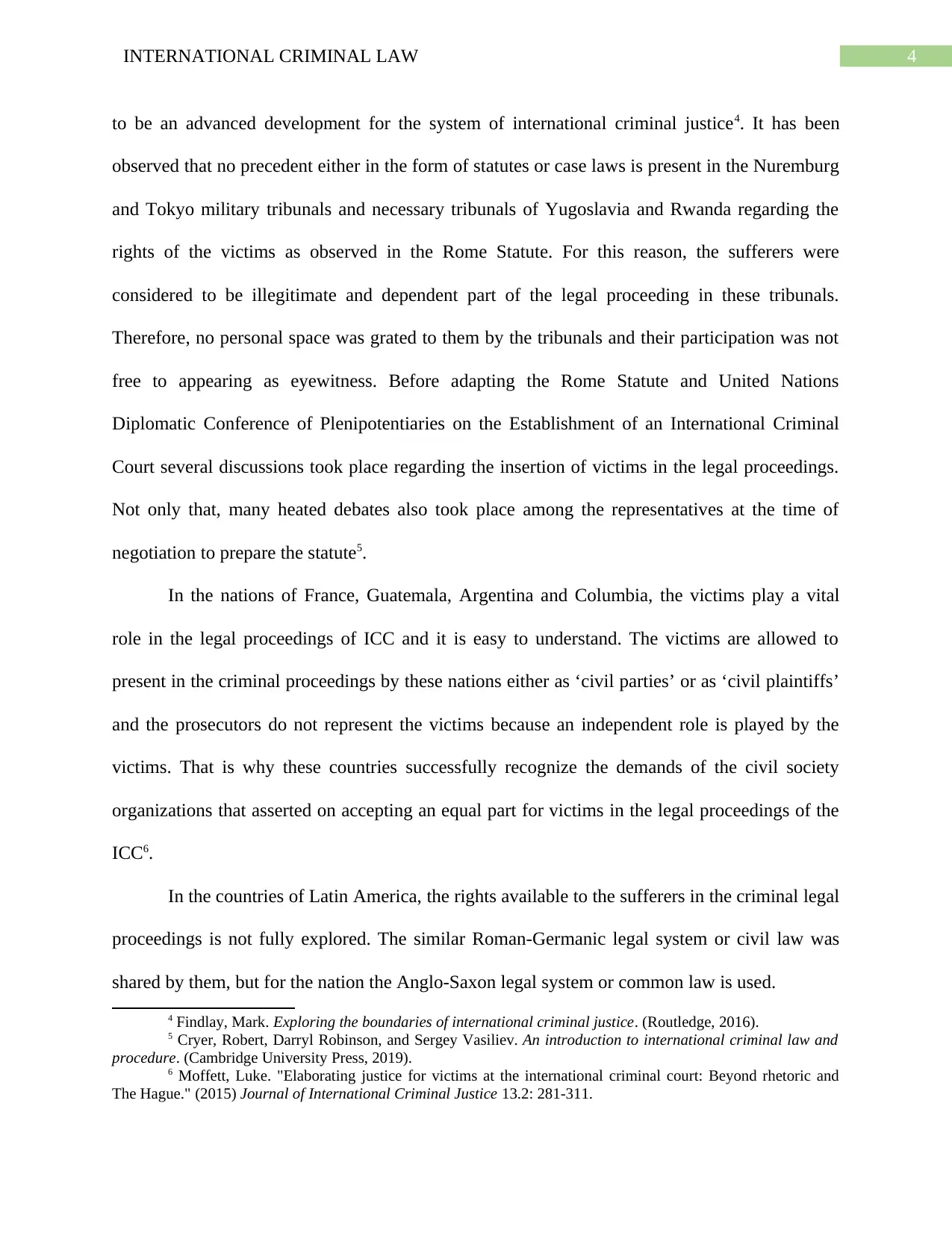
4INTERNATIONAL CRIMINAL LAW
to be an advanced development for the system of international criminal justice4. It has been
observed that no precedent either in the form of statutes or case laws is present in the Nuremburg
and Tokyo military tribunals and necessary tribunals of Yugoslavia and Rwanda regarding the
rights of the victims as observed in the Rome Statute. For this reason, the sufferers were
considered to be illegitimate and dependent part of the legal proceeding in these tribunals.
Therefore, no personal space was grated to them by the tribunals and their participation was not
free to appearing as eyewitness. Before adapting the Rome Statute and United Nations
Diplomatic Conference of Plenipotentiaries on the Establishment of an International Criminal
Court several discussions took place regarding the insertion of victims in the legal proceedings.
Not only that, many heated debates also took place among the representatives at the time of
negotiation to prepare the statute5.
In the nations of France, Guatemala, Argentina and Columbia, the victims play a vital
role in the legal proceedings of ICC and it is easy to understand. The victims are allowed to
present in the criminal proceedings by these nations either as ‘civil parties’ or as ‘civil plaintiffs’
and the prosecutors do not represent the victims because an independent role is played by the
victims. That is why these countries successfully recognize the demands of the civil society
organizations that asserted on accepting an equal part for victims in the legal proceedings of the
ICC6.
In the countries of Latin America, the rights available to the sufferers in the criminal legal
proceedings is not fully explored. The similar Roman-Germanic legal system or civil law was
shared by them, but for the nation the Anglo-Saxon legal system or common law is used.
4 Findlay, Mark. Exploring the boundaries of international criminal justice. (Routledge, 2016).
5 Cryer, Robert, Darryl Robinson, and Sergey Vasiliev. An introduction to international criminal law and
procedure. (Cambridge University Press, 2019).
6 Moffett, Luke. "Elaborating justice for victims at the international criminal court: Beyond rhetoric and
The Hague." (2015) Journal of International Criminal Justice 13.2: 281-311.
to be an advanced development for the system of international criminal justice4. It has been
observed that no precedent either in the form of statutes or case laws is present in the Nuremburg
and Tokyo military tribunals and necessary tribunals of Yugoslavia and Rwanda regarding the
rights of the victims as observed in the Rome Statute. For this reason, the sufferers were
considered to be illegitimate and dependent part of the legal proceeding in these tribunals.
Therefore, no personal space was grated to them by the tribunals and their participation was not
free to appearing as eyewitness. Before adapting the Rome Statute and United Nations
Diplomatic Conference of Plenipotentiaries on the Establishment of an International Criminal
Court several discussions took place regarding the insertion of victims in the legal proceedings.
Not only that, many heated debates also took place among the representatives at the time of
negotiation to prepare the statute5.
In the nations of France, Guatemala, Argentina and Columbia, the victims play a vital
role in the legal proceedings of ICC and it is easy to understand. The victims are allowed to
present in the criminal proceedings by these nations either as ‘civil parties’ or as ‘civil plaintiffs’
and the prosecutors do not represent the victims because an independent role is played by the
victims. That is why these countries successfully recognize the demands of the civil society
organizations that asserted on accepting an equal part for victims in the legal proceedings of the
ICC6.
In the countries of Latin America, the rights available to the sufferers in the criminal legal
proceedings is not fully explored. The similar Roman-Germanic legal system or civil law was
shared by them, but for the nation the Anglo-Saxon legal system or common law is used.
4 Findlay, Mark. Exploring the boundaries of international criminal justice. (Routledge, 2016).
5 Cryer, Robert, Darryl Robinson, and Sergey Vasiliev. An introduction to international criminal law and
procedure. (Cambridge University Press, 2019).
6 Moffett, Luke. "Elaborating justice for victims at the international criminal court: Beyond rhetoric and
The Hague." (2015) Journal of International Criminal Justice 13.2: 281-311.
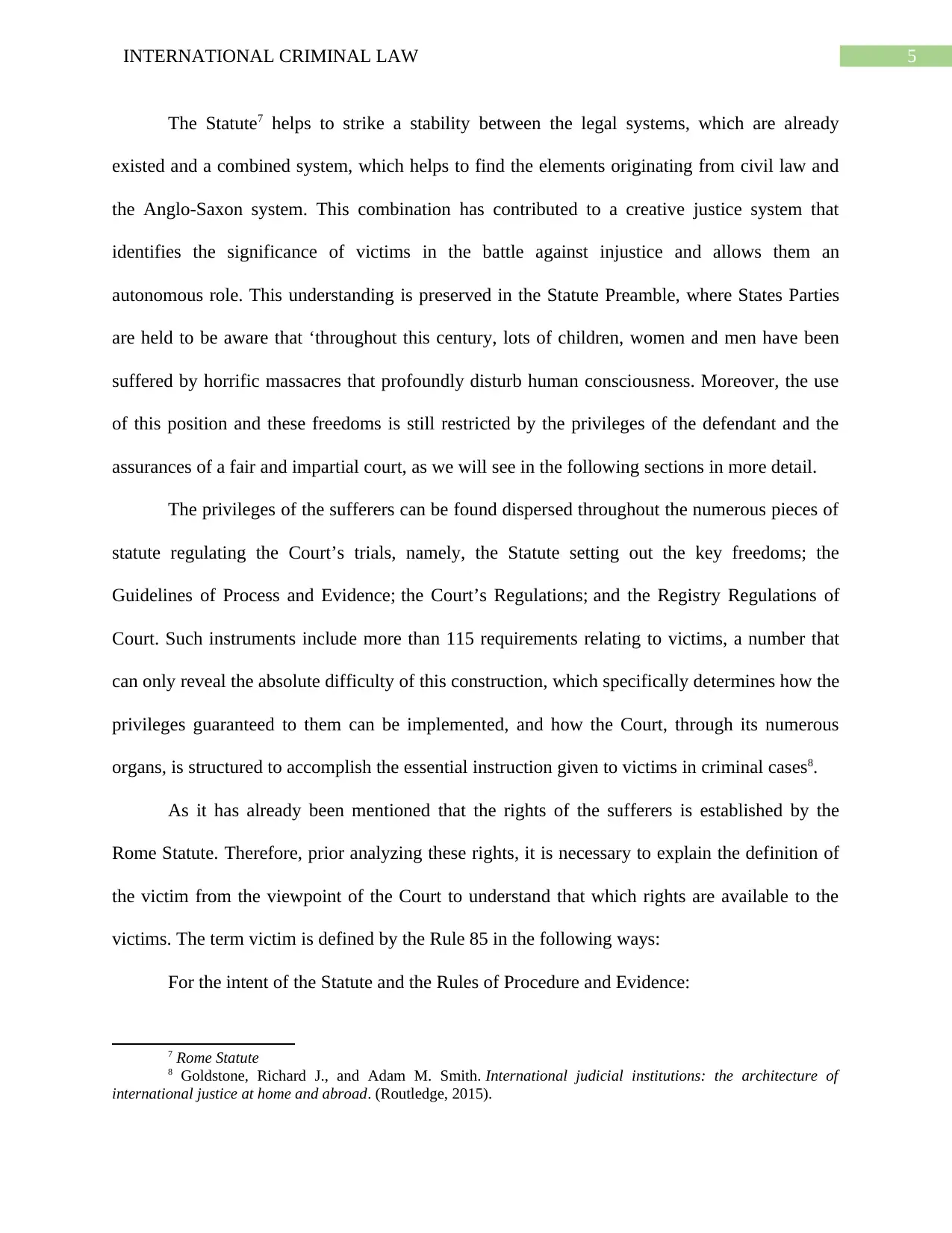
5INTERNATIONAL CRIMINAL LAW
The Statute7 helps to strike a stability between the legal systems, which are already
existed and a combined system, which helps to find the elements originating from civil law and
the Anglo-Saxon system. This combination has contributed to a creative justice system that
identifies the significance of victims in the battle against injustice and allows them an
autonomous role. This understanding is preserved in the Statute Preamble, where States Parties
are held to be aware that ‘throughout this century, lots of children, women and men have been
suffered by horrific massacres that profoundly disturb human consciousness. Moreover, the use
of this position and these freedoms is still restricted by the privileges of the defendant and the
assurances of a fair and impartial court, as we will see in the following sections in more detail.
The privileges of the sufferers can be found dispersed throughout the numerous pieces of
statute regulating the Court’s trials, namely, the Statute setting out the key freedoms; the
Guidelines of Process and Evidence; the Court’s Regulations; and the Registry Regulations of
Court. Such instruments include more than 115 requirements relating to victims, a number that
can only reveal the absolute difficulty of this construction, which specifically determines how the
privileges guaranteed to them can be implemented, and how the Court, through its numerous
organs, is structured to accomplish the essential instruction given to victims in criminal cases8.
As it has already been mentioned that the rights of the sufferers is established by the
Rome Statute. Therefore, prior analyzing these rights, it is necessary to explain the definition of
the victim from the viewpoint of the Court to understand that which rights are available to the
victims. The term victim is defined by the Rule 85 in the following ways:
For the intent of the Statute and the Rules of Procedure and Evidence:
7 Rome Statute
8 Goldstone, Richard J., and Adam M. Smith. International judicial institutions: the architecture of
international justice at home and abroad. (Routledge, 2015).
The Statute7 helps to strike a stability between the legal systems, which are already
existed and a combined system, which helps to find the elements originating from civil law and
the Anglo-Saxon system. This combination has contributed to a creative justice system that
identifies the significance of victims in the battle against injustice and allows them an
autonomous role. This understanding is preserved in the Statute Preamble, where States Parties
are held to be aware that ‘throughout this century, lots of children, women and men have been
suffered by horrific massacres that profoundly disturb human consciousness. Moreover, the use
of this position and these freedoms is still restricted by the privileges of the defendant and the
assurances of a fair and impartial court, as we will see in the following sections in more detail.
The privileges of the sufferers can be found dispersed throughout the numerous pieces of
statute regulating the Court’s trials, namely, the Statute setting out the key freedoms; the
Guidelines of Process and Evidence; the Court’s Regulations; and the Registry Regulations of
Court. Such instruments include more than 115 requirements relating to victims, a number that
can only reveal the absolute difficulty of this construction, which specifically determines how the
privileges guaranteed to them can be implemented, and how the Court, through its numerous
organs, is structured to accomplish the essential instruction given to victims in criminal cases8.
As it has already been mentioned that the rights of the sufferers is established by the
Rome Statute. Therefore, prior analyzing these rights, it is necessary to explain the definition of
the victim from the viewpoint of the Court to understand that which rights are available to the
victims. The term victim is defined by the Rule 85 in the following ways:
For the intent of the Statute and the Rules of Procedure and Evidence:
7 Rome Statute
8 Goldstone, Richard J., and Adam M. Smith. International judicial institutions: the architecture of
international justice at home and abroad. (Routledge, 2015).
⊘ This is a preview!⊘
Do you want full access?
Subscribe today to unlock all pages.

Trusted by 1+ million students worldwide
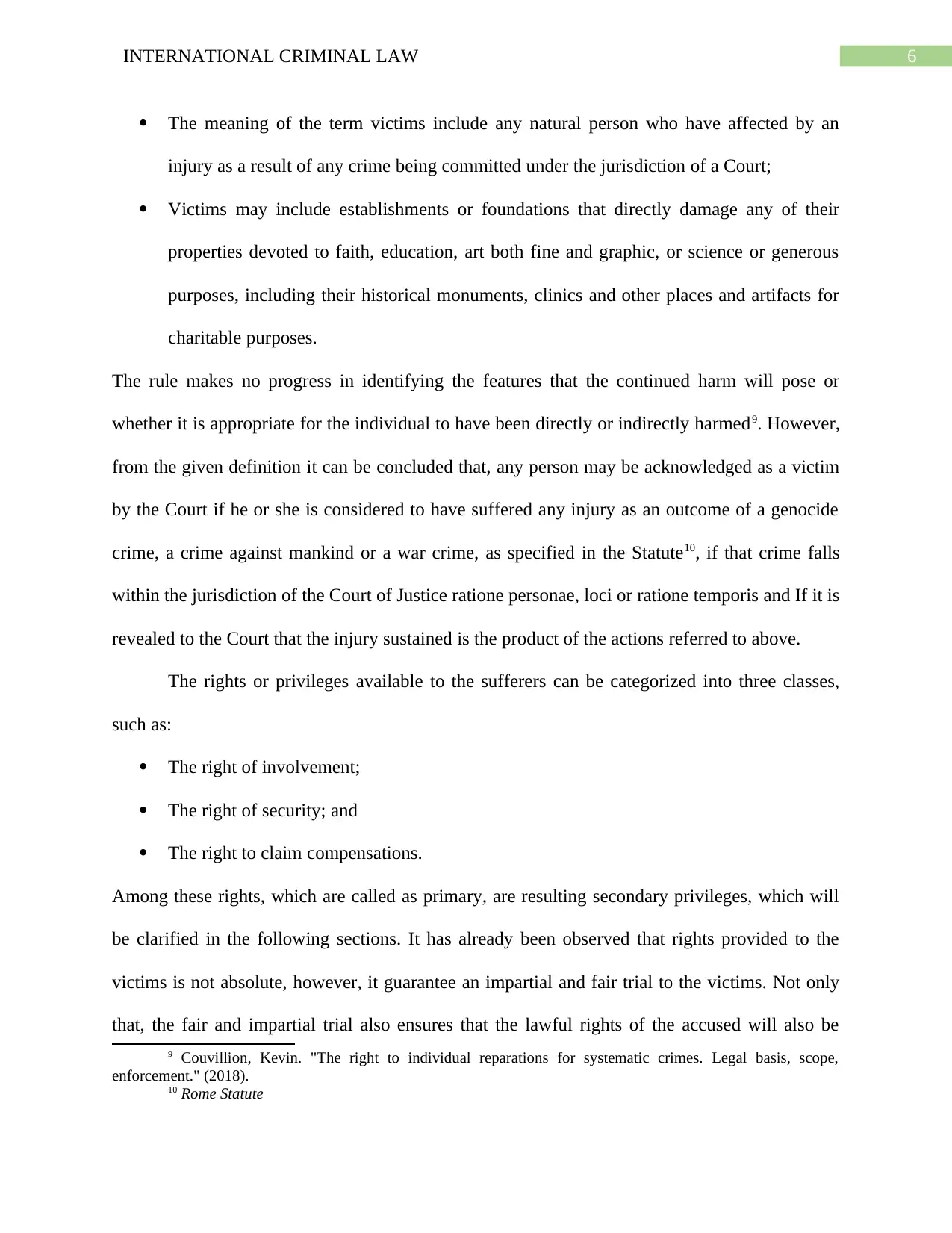
6INTERNATIONAL CRIMINAL LAW
The meaning of the term victims include any natural person who have affected by an
injury as a result of any crime being committed under the jurisdiction of a Court;
Victims may include establishments or foundations that directly damage any of their
properties devoted to faith, education, art both fine and graphic, or science or generous
purposes, including their historical monuments, clinics and other places and artifacts for
charitable purposes.
The rule makes no progress in identifying the features that the continued harm will pose or
whether it is appropriate for the individual to have been directly or indirectly harmed9. However,
from the given definition it can be concluded that, any person may be acknowledged as a victim
by the Court if he or she is considered to have suffered any injury as an outcome of a genocide
crime, a crime against mankind or a war crime, as specified in the Statute10, if that crime falls
within the jurisdiction of the Court of Justice ratione personae, loci or ratione temporis and If it is
revealed to the Court that the injury sustained is the product of the actions referred to above.
The rights or privileges available to the sufferers can be categorized into three classes,
such as:
The right of involvement;
The right of security; and
The right to claim compensations.
Among these rights, which are called as primary, are resulting secondary privileges, which will
be clarified in the following sections. It has already been observed that rights provided to the
victims is not absolute, however, it guarantee an impartial and fair trial to the victims. Not only
that, the fair and impartial trial also ensures that the lawful rights of the accused will also be
9 Couvillion, Kevin. "The right to individual reparations for systematic crimes. Legal basis, scope,
enforcement." (2018).
10 Rome Statute
The meaning of the term victims include any natural person who have affected by an
injury as a result of any crime being committed under the jurisdiction of a Court;
Victims may include establishments or foundations that directly damage any of their
properties devoted to faith, education, art both fine and graphic, or science or generous
purposes, including their historical monuments, clinics and other places and artifacts for
charitable purposes.
The rule makes no progress in identifying the features that the continued harm will pose or
whether it is appropriate for the individual to have been directly or indirectly harmed9. However,
from the given definition it can be concluded that, any person may be acknowledged as a victim
by the Court if he or she is considered to have suffered any injury as an outcome of a genocide
crime, a crime against mankind or a war crime, as specified in the Statute10, if that crime falls
within the jurisdiction of the Court of Justice ratione personae, loci or ratione temporis and If it is
revealed to the Court that the injury sustained is the product of the actions referred to above.
The rights or privileges available to the sufferers can be categorized into three classes,
such as:
The right of involvement;
The right of security; and
The right to claim compensations.
Among these rights, which are called as primary, are resulting secondary privileges, which will
be clarified in the following sections. It has already been observed that rights provided to the
victims is not absolute, however, it guarantee an impartial and fair trial to the victims. Not only
that, the fair and impartial trial also ensures that the lawful rights of the accused will also be
9 Couvillion, Kevin. "The right to individual reparations for systematic crimes. Legal basis, scope,
enforcement." (2018).
10 Rome Statute
Paraphrase This Document
Need a fresh take? Get an instant paraphrase of this document with our AI Paraphraser
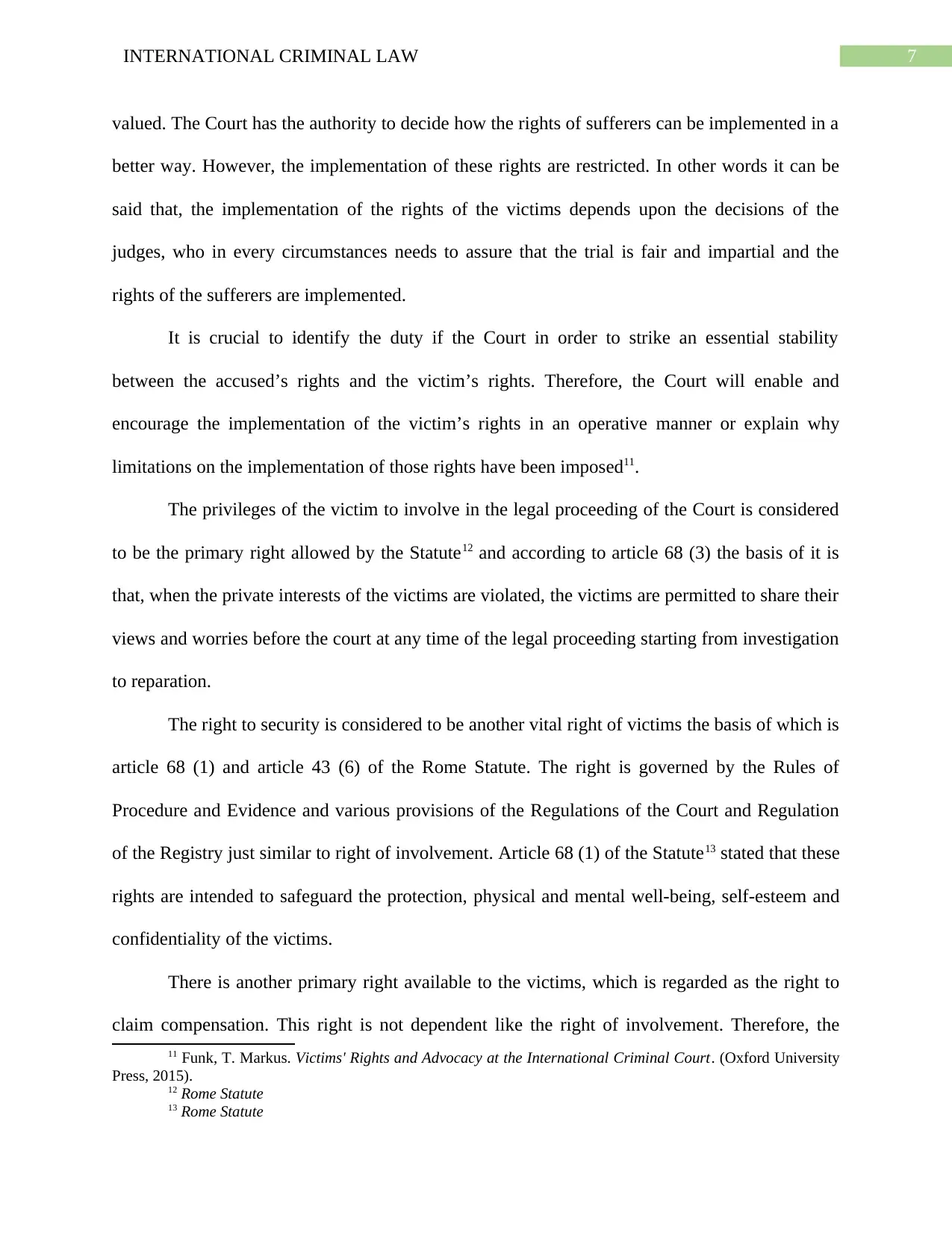
7INTERNATIONAL CRIMINAL LAW
valued. The Court has the authority to decide how the rights of sufferers can be implemented in a
better way. However, the implementation of these rights are restricted. In other words it can be
said that, the implementation of the rights of the victims depends upon the decisions of the
judges, who in every circumstances needs to assure that the trial is fair and impartial and the
rights of the sufferers are implemented.
It is crucial to identify the duty if the Court in order to strike an essential stability
between the accused’s rights and the victim’s rights. Therefore, the Court will enable and
encourage the implementation of the victim’s rights in an operative manner or explain why
limitations on the implementation of those rights have been imposed11.
The privileges of the victim to involve in the legal proceeding of the Court is considered
to be the primary right allowed by the Statute12 and according to article 68 (3) the basis of it is
that, when the private interests of the victims are violated, the victims are permitted to share their
views and worries before the court at any time of the legal proceeding starting from investigation
to reparation.
The right to security is considered to be another vital right of victims the basis of which is
article 68 (1) and article 43 (6) of the Rome Statute. The right is governed by the Rules of
Procedure and Evidence and various provisions of the Regulations of the Court and Regulation
of the Registry just similar to right of involvement. Article 68 (1) of the Statute13 stated that these
rights are intended to safeguard the protection, physical and mental well-being, self-esteem and
confidentiality of the victims.
There is another primary right available to the victims, which is regarded as the right to
claim compensation. This right is not dependent like the right of involvement. Therefore, the
11 Funk, T. Markus. Victims' Rights and Advocacy at the International Criminal Court. (Oxford University
Press, 2015).
12 Rome Statute
13 Rome Statute
valued. The Court has the authority to decide how the rights of sufferers can be implemented in a
better way. However, the implementation of these rights are restricted. In other words it can be
said that, the implementation of the rights of the victims depends upon the decisions of the
judges, who in every circumstances needs to assure that the trial is fair and impartial and the
rights of the sufferers are implemented.
It is crucial to identify the duty if the Court in order to strike an essential stability
between the accused’s rights and the victim’s rights. Therefore, the Court will enable and
encourage the implementation of the victim’s rights in an operative manner or explain why
limitations on the implementation of those rights have been imposed11.
The privileges of the victim to involve in the legal proceeding of the Court is considered
to be the primary right allowed by the Statute12 and according to article 68 (3) the basis of it is
that, when the private interests of the victims are violated, the victims are permitted to share their
views and worries before the court at any time of the legal proceeding starting from investigation
to reparation.
The right to security is considered to be another vital right of victims the basis of which is
article 68 (1) and article 43 (6) of the Rome Statute. The right is governed by the Rules of
Procedure and Evidence and various provisions of the Regulations of the Court and Regulation
of the Registry just similar to right of involvement. Article 68 (1) of the Statute13 stated that these
rights are intended to safeguard the protection, physical and mental well-being, self-esteem and
confidentiality of the victims.
There is another primary right available to the victims, which is regarded as the right to
claim compensation. This right is not dependent like the right of involvement. Therefore, the
11 Funk, T. Markus. Victims' Rights and Advocacy at the International Criminal Court. (Oxford University
Press, 2015).
12 Rome Statute
13 Rome Statute
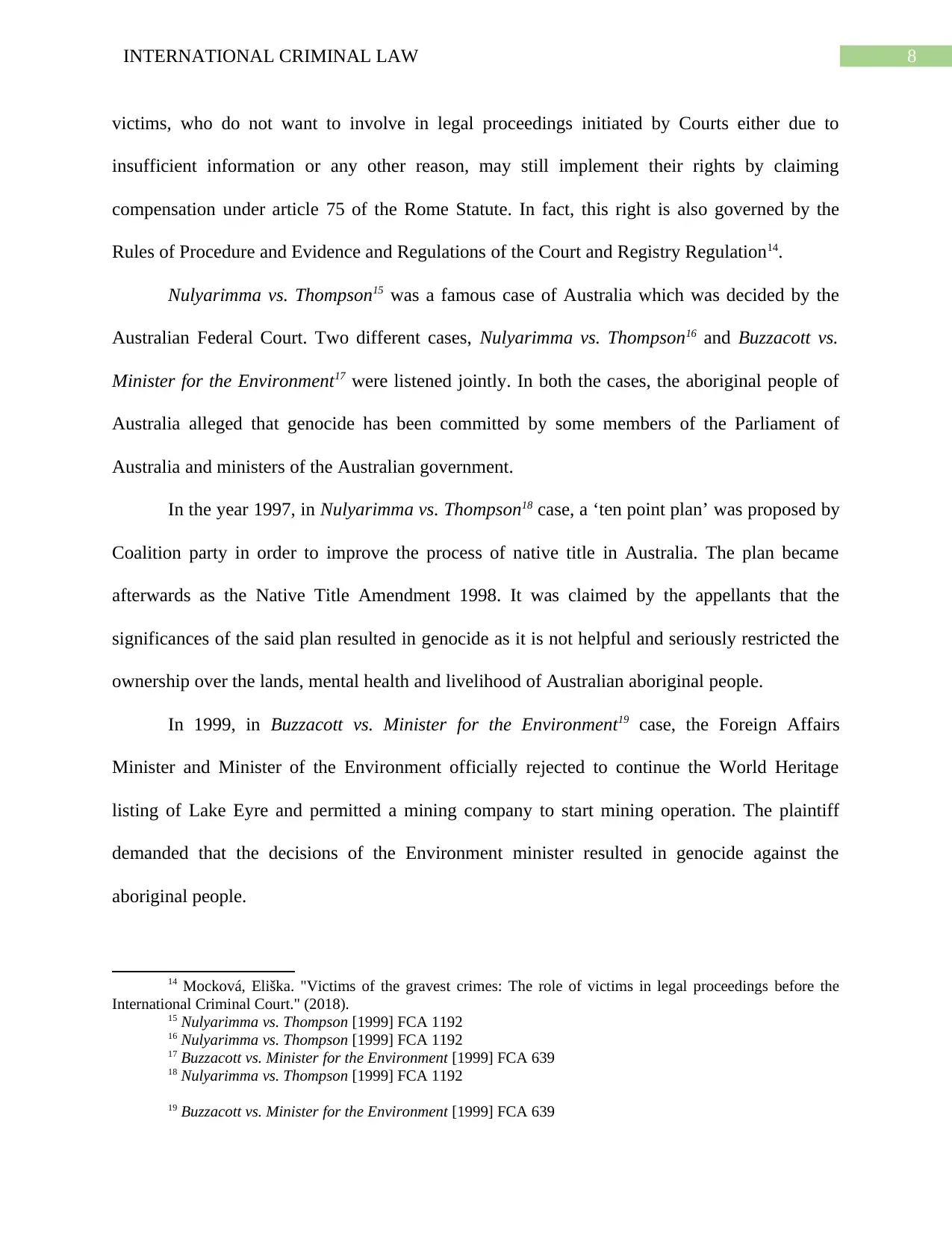
8INTERNATIONAL CRIMINAL LAW
victims, who do not want to involve in legal proceedings initiated by Courts either due to
insufficient information or any other reason, may still implement their rights by claiming
compensation under article 75 of the Rome Statute. In fact, this right is also governed by the
Rules of Procedure and Evidence and Regulations of the Court and Registry Regulation14.
Nulyarimma vs. Thompson15 was a famous case of Australia which was decided by the
Australian Federal Court. Two different cases, Nulyarimma vs. Thompson16 and Buzzacott vs.
Minister for the Environment17 were listened jointly. In both the cases, the aboriginal people of
Australia alleged that genocide has been committed by some members of the Parliament of
Australia and ministers of the Australian government.
In the year 1997, in Nulyarimma vs. Thompson18 case, a ‘ten point plan’ was proposed by
Coalition party in order to improve the process of native title in Australia. The plan became
afterwards as the Native Title Amendment 1998. It was claimed by the appellants that the
significances of the said plan resulted in genocide as it is not helpful and seriously restricted the
ownership over the lands, mental health and livelihood of Australian aboriginal people.
In 1999, in Buzzacott vs. Minister for the Environment19 case, the Foreign Affairs
Minister and Minister of the Environment officially rejected to continue the World Heritage
listing of Lake Eyre and permitted a mining company to start mining operation. The plaintiff
demanded that the decisions of the Environment minister resulted in genocide against the
aboriginal people.
14 Mocková, Eliška. "Victims of the gravest crimes: The role of victims in legal proceedings before the
International Criminal Court." (2018).
15 Nulyarimma vs. Thompson [1999] FCA 1192
16 Nulyarimma vs. Thompson [1999] FCA 1192
17 Buzzacott vs. Minister for the Environment [1999] FCA 639
18 Nulyarimma vs. Thompson [1999] FCA 1192
19 Buzzacott vs. Minister for the Environment [1999] FCA 639
victims, who do not want to involve in legal proceedings initiated by Courts either due to
insufficient information or any other reason, may still implement their rights by claiming
compensation under article 75 of the Rome Statute. In fact, this right is also governed by the
Rules of Procedure and Evidence and Regulations of the Court and Registry Regulation14.
Nulyarimma vs. Thompson15 was a famous case of Australia which was decided by the
Australian Federal Court. Two different cases, Nulyarimma vs. Thompson16 and Buzzacott vs.
Minister for the Environment17 were listened jointly. In both the cases, the aboriginal people of
Australia alleged that genocide has been committed by some members of the Parliament of
Australia and ministers of the Australian government.
In the year 1997, in Nulyarimma vs. Thompson18 case, a ‘ten point plan’ was proposed by
Coalition party in order to improve the process of native title in Australia. The plan became
afterwards as the Native Title Amendment 1998. It was claimed by the appellants that the
significances of the said plan resulted in genocide as it is not helpful and seriously restricted the
ownership over the lands, mental health and livelihood of Australian aboriginal people.
In 1999, in Buzzacott vs. Minister for the Environment19 case, the Foreign Affairs
Minister and Minister of the Environment officially rejected to continue the World Heritage
listing of Lake Eyre and permitted a mining company to start mining operation. The plaintiff
demanded that the decisions of the Environment minister resulted in genocide against the
aboriginal people.
14 Mocková, Eliška. "Victims of the gravest crimes: The role of victims in legal proceedings before the
International Criminal Court." (2018).
15 Nulyarimma vs. Thompson [1999] FCA 1192
16 Nulyarimma vs. Thompson [1999] FCA 1192
17 Buzzacott vs. Minister for the Environment [1999] FCA 639
18 Nulyarimma vs. Thompson [1999] FCA 1192
19 Buzzacott vs. Minister for the Environment [1999] FCA 639
⊘ This is a preview!⊘
Do you want full access?
Subscribe today to unlock all pages.

Trusted by 1+ million students worldwide
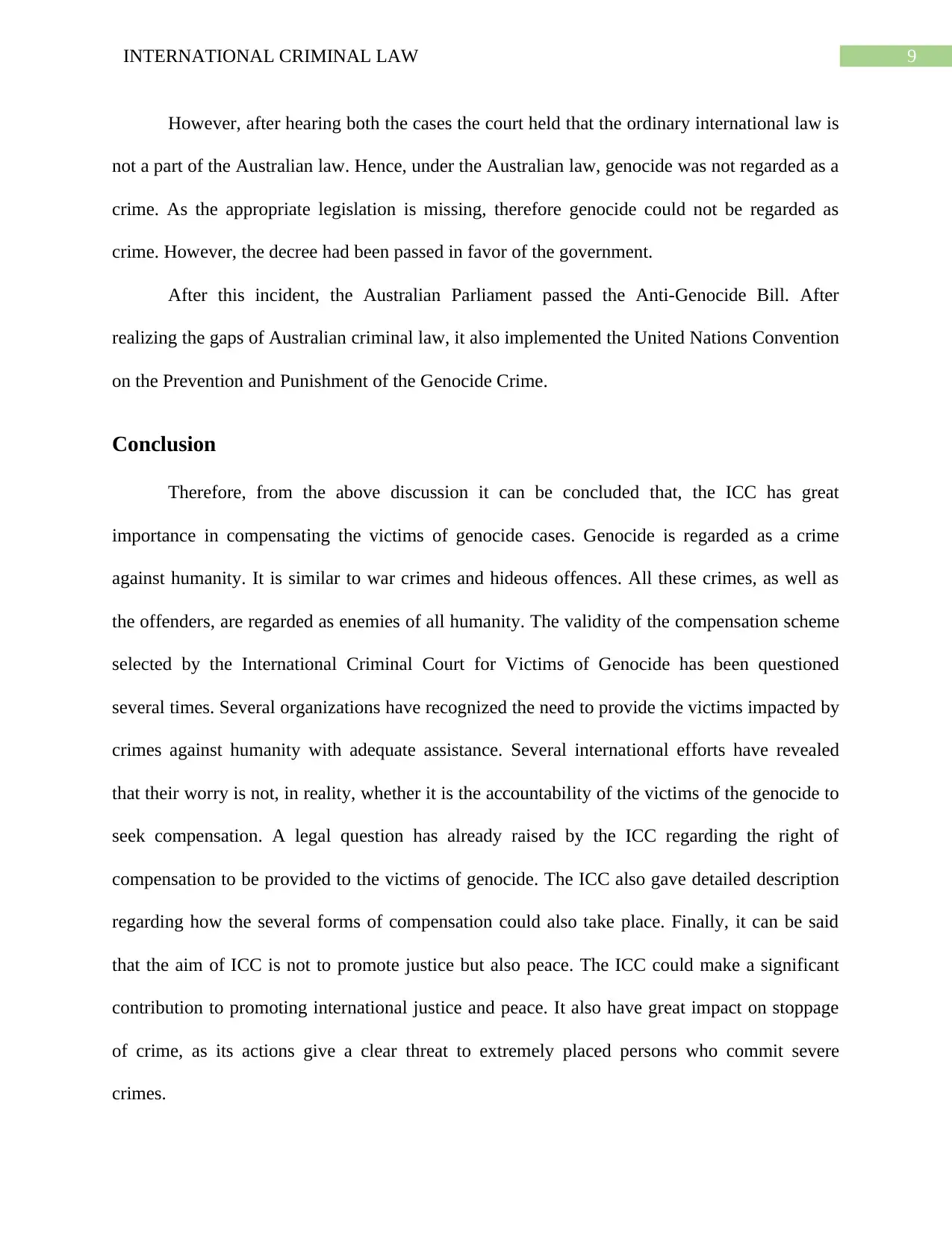
9INTERNATIONAL CRIMINAL LAW
However, after hearing both the cases the court held that the ordinary international law is
not a part of the Australian law. Hence, under the Australian law, genocide was not regarded as a
crime. As the appropriate legislation is missing, therefore genocide could not be regarded as
crime. However, the decree had been passed in favor of the government.
After this incident, the Australian Parliament passed the Anti-Genocide Bill. After
realizing the gaps of Australian criminal law, it also implemented the United Nations Convention
on the Prevention and Punishment of the Genocide Crime.
Conclusion
Therefore, from the above discussion it can be concluded that, the ICC has great
importance in compensating the victims of genocide cases. Genocide is regarded as a crime
against humanity. It is similar to war crimes and hideous offences. All these crimes, as well as
the offenders, are regarded as enemies of all humanity. The validity of the compensation scheme
selected by the International Criminal Court for Victims of Genocide has been questioned
several times. Several organizations have recognized the need to provide the victims impacted by
crimes against humanity with adequate assistance. Several international efforts have revealed
that their worry is not, in reality, whether it is the accountability of the victims of the genocide to
seek compensation. A legal question has already raised by the ICC regarding the right of
compensation to be provided to the victims of genocide. The ICC also gave detailed description
regarding how the several forms of compensation could also take place. Finally, it can be said
that the aim of ICC is not to promote justice but also peace. The ICC could make a significant
contribution to promoting international justice and peace. It also have great impact on stoppage
of crime, as its actions give a clear threat to extremely placed persons who commit severe
crimes.
However, after hearing both the cases the court held that the ordinary international law is
not a part of the Australian law. Hence, under the Australian law, genocide was not regarded as a
crime. As the appropriate legislation is missing, therefore genocide could not be regarded as
crime. However, the decree had been passed in favor of the government.
After this incident, the Australian Parliament passed the Anti-Genocide Bill. After
realizing the gaps of Australian criminal law, it also implemented the United Nations Convention
on the Prevention and Punishment of the Genocide Crime.
Conclusion
Therefore, from the above discussion it can be concluded that, the ICC has great
importance in compensating the victims of genocide cases. Genocide is regarded as a crime
against humanity. It is similar to war crimes and hideous offences. All these crimes, as well as
the offenders, are regarded as enemies of all humanity. The validity of the compensation scheme
selected by the International Criminal Court for Victims of Genocide has been questioned
several times. Several organizations have recognized the need to provide the victims impacted by
crimes against humanity with adequate assistance. Several international efforts have revealed
that their worry is not, in reality, whether it is the accountability of the victims of the genocide to
seek compensation. A legal question has already raised by the ICC regarding the right of
compensation to be provided to the victims of genocide. The ICC also gave detailed description
regarding how the several forms of compensation could also take place. Finally, it can be said
that the aim of ICC is not to promote justice but also peace. The ICC could make a significant
contribution to promoting international justice and peace. It also have great impact on stoppage
of crime, as its actions give a clear threat to extremely placed persons who commit severe
crimes.
Paraphrase This Document
Need a fresh take? Get an instant paraphrase of this document with our AI Paraphraser
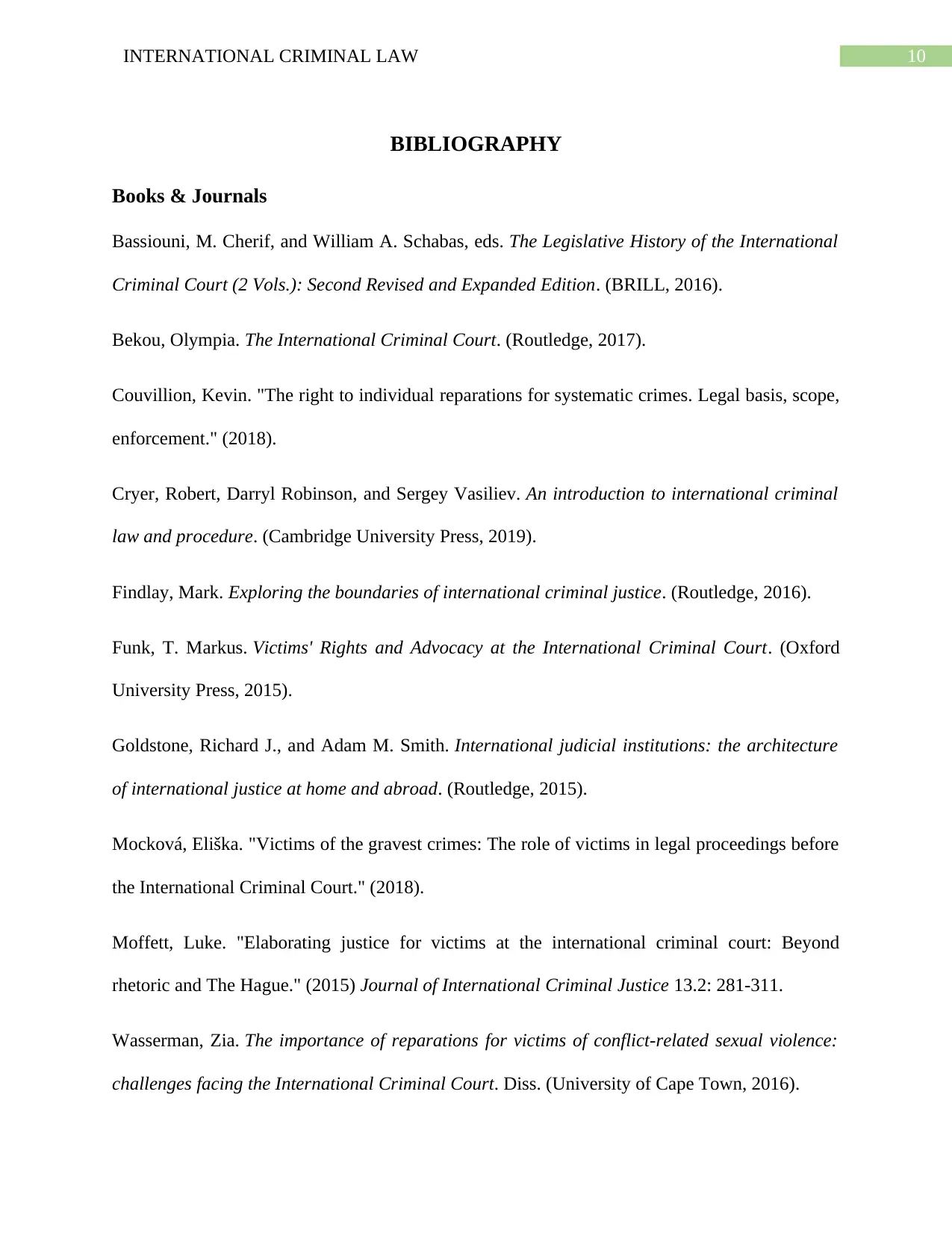
10INTERNATIONAL CRIMINAL LAW
BIBLIOGRAPHY
Books & Journals
Bassiouni, M. Cherif, and William A. Schabas, eds. The Legislative History of the International
Criminal Court (2 Vols.): Second Revised and Expanded Edition. (BRILL, 2016).
Bekou, Olympia. The International Criminal Court. (Routledge, 2017).
Couvillion, Kevin. "The right to individual reparations for systematic crimes. Legal basis, scope,
enforcement." (2018).
Cryer, Robert, Darryl Robinson, and Sergey Vasiliev. An introduction to international criminal
law and procedure. (Cambridge University Press, 2019).
Findlay, Mark. Exploring the boundaries of international criminal justice. (Routledge, 2016).
Funk, T. Markus. Victims' Rights and Advocacy at the International Criminal Court. (Oxford
University Press, 2015).
Goldstone, Richard J., and Adam M. Smith. International judicial institutions: the architecture
of international justice at home and abroad. (Routledge, 2015).
Mocková, Eliška. "Victims of the gravest crimes: The role of victims in legal proceedings before
the International Criminal Court." (2018).
Moffett, Luke. "Elaborating justice for victims at the international criminal court: Beyond
rhetoric and The Hague." (2015) Journal of International Criminal Justice 13.2: 281-311.
Wasserman, Zia. The importance of reparations for victims of conflict-related sexual violence:
challenges facing the International Criminal Court. Diss. (University of Cape Town, 2016).
BIBLIOGRAPHY
Books & Journals
Bassiouni, M. Cherif, and William A. Schabas, eds. The Legislative History of the International
Criminal Court (2 Vols.): Second Revised and Expanded Edition. (BRILL, 2016).
Bekou, Olympia. The International Criminal Court. (Routledge, 2017).
Couvillion, Kevin. "The right to individual reparations for systematic crimes. Legal basis, scope,
enforcement." (2018).
Cryer, Robert, Darryl Robinson, and Sergey Vasiliev. An introduction to international criminal
law and procedure. (Cambridge University Press, 2019).
Findlay, Mark. Exploring the boundaries of international criminal justice. (Routledge, 2016).
Funk, T. Markus. Victims' Rights and Advocacy at the International Criminal Court. (Oxford
University Press, 2015).
Goldstone, Richard J., and Adam M. Smith. International judicial institutions: the architecture
of international justice at home and abroad. (Routledge, 2015).
Mocková, Eliška. "Victims of the gravest crimes: The role of victims in legal proceedings before
the International Criminal Court." (2018).
Moffett, Luke. "Elaborating justice for victims at the international criminal court: Beyond
rhetoric and The Hague." (2015) Journal of International Criminal Justice 13.2: 281-311.
Wasserman, Zia. The importance of reparations for victims of conflict-related sexual violence:
challenges facing the International Criminal Court. Diss. (University of Cape Town, 2016).
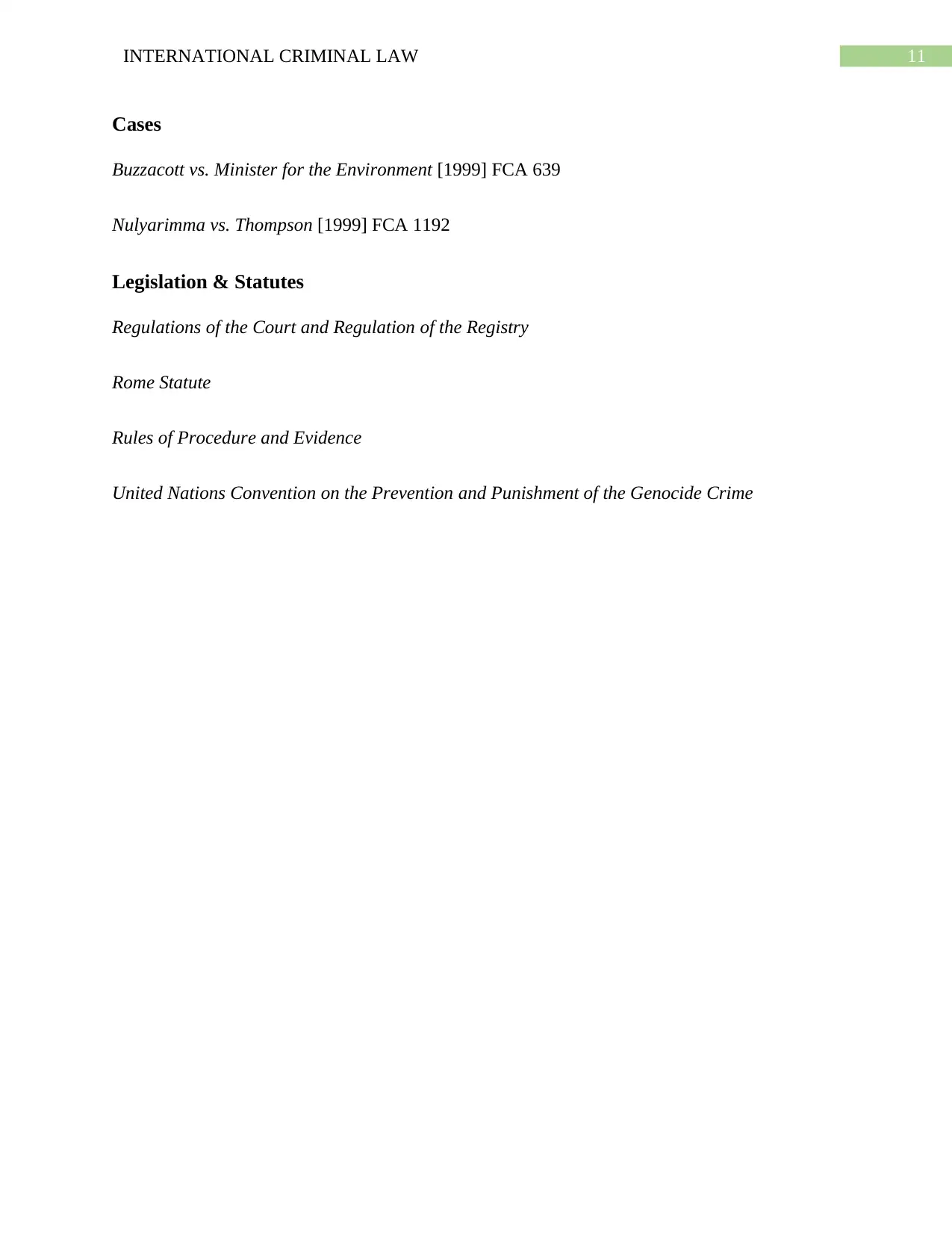
11INTERNATIONAL CRIMINAL LAW
Cases
Buzzacott vs. Minister for the Environment [1999] FCA 639
Nulyarimma vs. Thompson [1999] FCA 1192
Legislation & Statutes
Regulations of the Court and Regulation of the Registry
Rome Statute
Rules of Procedure and Evidence
United Nations Convention on the Prevention and Punishment of the Genocide Crime
Cases
Buzzacott vs. Minister for the Environment [1999] FCA 639
Nulyarimma vs. Thompson [1999] FCA 1192
Legislation & Statutes
Regulations of the Court and Regulation of the Registry
Rome Statute
Rules of Procedure and Evidence
United Nations Convention on the Prevention and Punishment of the Genocide Crime
⊘ This is a preview!⊘
Do you want full access?
Subscribe today to unlock all pages.

Trusted by 1+ million students worldwide
1 out of 12
Related Documents
Your All-in-One AI-Powered Toolkit for Academic Success.
+13062052269
info@desklib.com
Available 24*7 on WhatsApp / Email
![[object Object]](/_next/static/media/star-bottom.7253800d.svg)
Unlock your academic potential
Copyright © 2020–2026 A2Z Services. All Rights Reserved. Developed and managed by ZUCOL.



